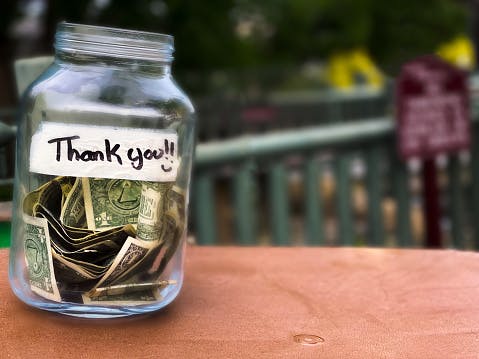America’s tip economy, visualized
How America taxes tips is set to change — but not everyone will benefit equally from the “No Tax on Tips” provision.
In January, President Trump said at a rally in Las Vegas, “If you’re a restaurant worker, a server, a valet, a bellhop, a bartender, or one of my caddies... or any other worker who relies on tipped income, your tips will be 100% yours.”
That line became the “No Tax on Tips” provision in July — as part of Trump’s One Big Beautiful Bill Act — letting workers earning under $150,000 a year deduct up to $25,000 in tips from their federal taxable income from 2025 through 2028.
And last Friday, the Treasury and IRS revealed a draft rule giving a clearer picture of who might benefit — and who won’t. The proposal includes a list of 68 jobs where tipping is common, from bartenders and fast-food workers to makeup artists and locksmiths, alongside IRS data on how often tips are reported.
Roughly 70% to 80% of wait staff, bartenders, and gambling dealers report tips, which account for 60% to 70% of their wages. Musicians, dancers, and digital creators tell a different story: only about 3% to 9% report tips, yet for those who do, tips can make up a third to half of their income. In contrast, home maintenance and repair crews rarely report tips, and when they do, it’s mostly pocket change. Of course, these figures in general are likely understated, assuming some workers underreport or misreport tips on their tax forms.
Like, comment, subscribe… and tip!
Not every job on the list makes the cut. The law excludes those tied to “specified service trades or businesses,” such as health, law, finance, athletics, and performing arts — meaning actors, musicians, and dancers won’t qualify. Meanwhile, digital creators like Twitch streamers and podcasters are in, but with one big asterisk: tips tied to illegal activity, prostitution, or pornographic activity don’t qualify, carving out adult content platforms like OnlyFans. The Treasury has scheduled a public hearing for October 23 before finalizing the rules.
So how big is this, for households and for Washington?
The White House’s Council of Economic Advisors says tipped workers will gain ~$1,300 a year in take-home pay. That affects roughly 4 million Americans, or 2.5% of the US workforce — many of whom already owe little or no income tax, per the Yale Budget Lab.
Meanwhile, the nonpartisan Joint Committee on Taxation estimates the tax break will cost $32 billion over its temporary four-year run.
